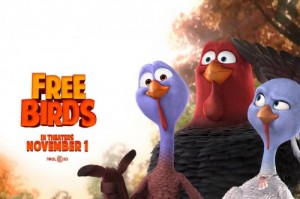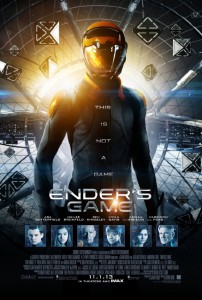“Free Birds,” an animated film opening today, stars Owen Wilson, Amy Poehler, and Woody Harrelson. And it has a great score by composer Dominic Lewis available on iTunes. He talked to me about what it was like to write music for a movie about time-traveling turkeys.
You could hardly have set yourself a more complicated challenge because you had science fiction element, history, comedy, and even romance. How do you begin to approach something like that?
I always watch a movie a few times before embarking on trying to come up with stuff that works. And I guess the great thing about it was that Jimmy gave me free reign. You know, it was a blank canvass. And he basically said “Do your thing.” And the lovely thing about the movie is it’s so fast-paced, I got a chance to explore all those different genres of music and it’s not just all those one thing. But I’d like to think that they’re going to take together in some shape or form. So it’s really great to be able to not just be in one box, which is what’s so great about animations is that you’re allowed to speak completely freely at whatever you’re doing to express yourself.
Is it different to score for animation that it is for live action? 
Oh, hugely, yeah. I mean the thing with live action is that everything needs to be modern and visual. So gone are the days of being able to really pull from classical composers such as a lot of Stravinski and Chopin was used back in the day. With animation, it’s just a really great opportunity to be able to pull all your tricks out the box and really write. Whilst in live action and not negatively at all, but there are boxes that you need to tick. But it’s the animation that’s definitely freer which I love. It’s just lovely to do that.
I’m a little interested to hear that you saw the film before you started writing the score. So at what point did you get involved with the project?
Well music is the last thing to go in. I got involved, I guess I’d say, slightly before a composer would normally would come on which is nice because I saw the whole thing evolve from storyboards all the way through to its finished product now. That’s been a really cool journey. But yeah, I mean music is the last thing to go on so the film is able to be watched and you need to be able to see the whole thing down and ideas if they’re going to work with the whole thing. So that’s the normal process. And I guess, from then on, it was a question of coming up with scenes based on the images. I had meetings with Jimmy about what he wanted and so we kind of went from there really.
And does the theme of time travel pose any particular challenges?
It has to be in the realm of the sci-fi world which is nice. I got to use a lot of space-like sounds and electronic stuff with time travel. It was a nice challenge. It was a really good challenge to me to get my hands dirty with that one and trying to come up with something that works.
What was the first film you worked on?
I did my first movie in about 2007. In the US, it was called “Hearts of War.” Everywhere else, it was called “The Poet” and that was directed by Damian Lee. Before that, Rupert Gregson-Williams sort of took me under his wings when I was 15, 16 so I would go down to Rupert’s studio and watch him working and do a few vocal things for him, and he’d leave to make a cup of tea, and he’d say just tell me to play around with the samples and get a feel of his stuff. So a teenager, I was in and amongst the world of film music. Plus my father is a cellist and plays on all the movie soundtracks and pop stuff in London. So I was brought up with this stuff. We had work experience at school. When you’re 14, 15 you’re shoved into a workplace to see what you want to do. And I was lucky enough to go to work with my dad. I just fell in love with it. It was from then on, it was like “I have to do this.”
What kind of music did you listen to in the home?
It was everything. I mean it was predominantly classical with both parents being classically trained and working in the classical world. My Mom’s a singer and my Dad’s was in a quartet and played on soundtracks. And I started cello when I was 3. So a lot of classical, but as every parent is, they are also huge Beatles fans. We listened to the Beatles and the Beach Boys and, you know, on trips going to the seaside and stuff. So it was everything. And I’ve got an older sister as well so when she was a teenager, she was listening to all sorts of grunge music and Iindie music. And that all filtered down to me. Yeah. It was everything, really, which you need to have in film music. You need to have everything.
Was it recorded in England?
Yeah. We went over to London to record the orchestra which was great because I got to hang out with my Dad for four days. Normally when I go back to London, I’m working and I don’t get to see my family. But my Dad is the only one I get to see because he’s always in the sessions with me so it’s really nice to have it in the family like that. It’s great. And the guys over there, they’re unbelievable musicians. I mean some of the stuff in this score you can probably hear is quite tricky. Hard and it’s all over the place, and epic, and big.
Do you have a favorite all time film score?
I absolutely love Alan Silvestri’s “Back to the Future.” I still think its theme is just perfect. It’s one of those things that you can just put with anything and it just worked. If I could choose a moment of filmmaking married with music, I think I’d choose the last 15 minutes of E.T. John Williams. It is just incredible and also because of the whole story behind it. It’s one of the very few times that picture has been cut up to music rather than the other way around. They were recording the score of E.T. and he couldn’t quite get the performance he wanted so in the end, Spielberg said “You just record it how you want it done and I’ll cut the picture with the music.” It’s just a perfect performance and it’s just so perfect for the end for that moment in the movie. When that track comes on my iPod or whatever, I can be in the bus and I’d get off the bus, absolutely in flood with tears. I think if I have to choose, that would be the moment that I’d choose.
is now available on VOD and iTunes, Amazon, Google Play, and major cable networks including Verizon Fios, AT&T, Dish, and Charter.


